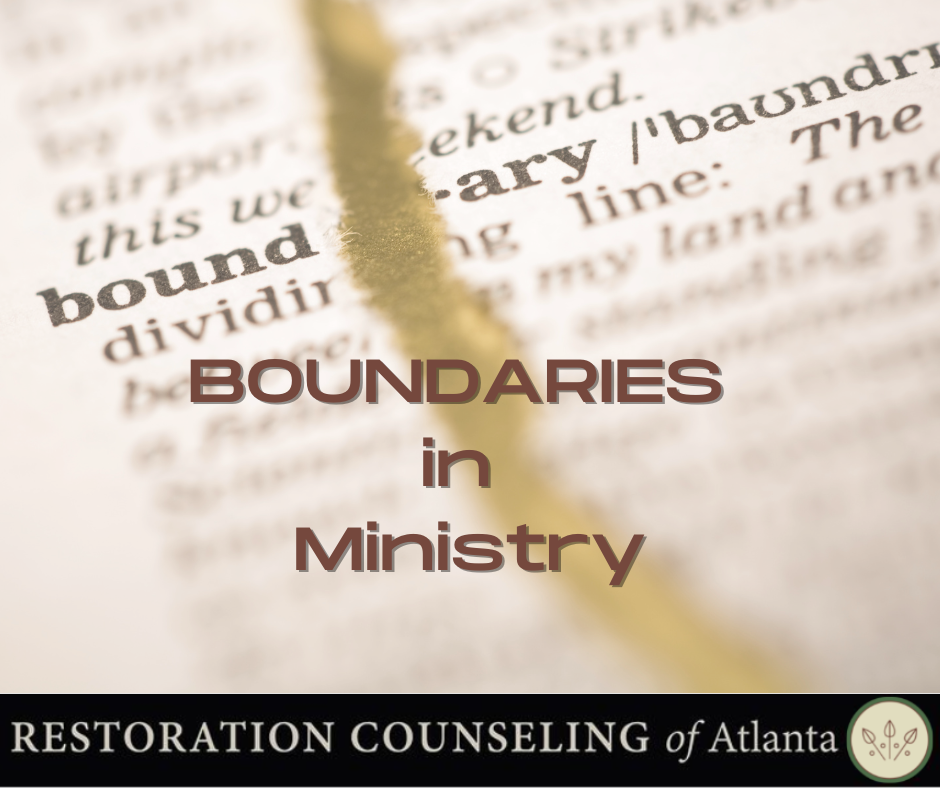During my four years working for campus ministries, first at Auburn University and then at Georgia Tech, I realized how challenging it was to be on the front lines of ministry. That realization inspired me to go to graduate school for counseling and gave me the desire to walk alongside others working in ministry. Now, I have the honor of working with men and women in ministry, and the topic of healthy boundaries comes up with all these clients.
Those you serve are looking to you to understand how to carry themselves as a follower of Jesus in this world! The old phrase, “more is caught than taught,” applies here. People will pick up on how you live, not just what you say. This is an opportunity to model healthy boundaries to those looking up to you.
Time Boundaries
In this demanding role, you likely give up many evenings, weekends, and holidays. That is significant! Even fun events that don’t feel like work, are. You’re on the clock and need to keep your energy level up. If you were to track your hours, I bet you’d find that you’re putting in more time than you realize.
A rule of thumb that helped me was to work two-thirds of the day. If I knew I had an evening event, I would either take the morning or afternoon off. If I knew I had an early morning, I would try to have a strict end time in the afternoon. When I had a dinner planned with a student in the evening, I would make sure to get away for a few hours during the day. The Gospels repeatedly show Jesus going off to pray and recharge. How much more must we need to do the same?
Consider having a hard-and-fast rule that you will only communicate with those you serve during business hours. It is so easy to send a quick text in the evening. Instead, make yourself a note to message them first thing the next morning. Your brain needs those precious hours off.
Emotional Boundaries
Notice how much you spend time with those in the ministry. The lines between mentor/pastor and friend can be blurry. On one hand, it is crucial to have close, trusting relationships; however, you are in a position of authority that cannot be overlooked. Unfortunately, we’ve all heard horror stories of people being taken advantage of by spiritual leaders. Most of us will thankfully not come anywhere close to that level of abuse of power, but we want to be transparent and not even start down that road.
Notice what you share with those you serve. Jesus models friendship with his followers, and we know he was closest to Peter, James, and John. There is nothing wrong with pouring more energy into those who are more committed! However, Jesus did not look to his followers to meet his emotional needs and those of us in ministerial roles need to look outside of our congregants for emotional support.
It’s easy to get caught up in putting on events, writing sermons, or keeping up with numbers or finances. This is not God’s design for our ministries. When we set a boundary and step back, we are saying, “God, I trust that even though my hand isn’t in every piece of this, yours is.” That will always lead to a better outcome! His desire is for his children to be faithful stewards of what he has entrusted us with, not for us to take matters into our own hands.
A Word on Burnout
Typically, those of us drawn to ministry roles enjoy being a helper and have difficulty saying “no.” A professor told me, “When we say ‘yes’ to anything, we are automatically saying ‘no’ to something else.” What we repeatedly neglect is the filling up of our personal energy tanks. Then, perhaps years down the road, we hit a wall and burn out because we didn’t put our own oxygen masks on first. Ministry work is a marathon, not a sprint. Having boundaries and trusting God helps us make it to the finish line strong.
A few final pointers: find people who can support you and with whom you can be honest about how you’re doing – even about the good, bad, and ugly! Take breaks, show up, and leave the results to God.
Whether or not you work in ministry, these are important lessons to learn! If you are interested in talking more, reach out to me anytime at hannah@restorationcounselingatl.com.

![]() Written by Hannah Clark, MA, APC
Written by Hannah Clark, MA, APC
hannah@restorationcounselingatl.com, ext. 122
Roswell and Woodstock locations
Hannah’s philosophy is that counseling is for everyone. Just like we take our cars to get the oil changed, mental health works the same way: the check engine light comes on, and we need to take a look under the hood. Hannah enjoys counseling individuals age 18 and up. She utilizes EMDR therapy to help with trauma and PTSD. She also sees individuals for issues such as grief, depression, anxiety, boundaries, life transitions, and spiritual or emotional abuse. Hannah previously worked for a college ministry and enjoys helping college students and women in (or formerly in) ministry.

